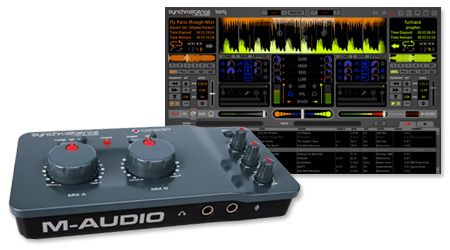10686
Free delivery and returns on eligible orders of £20 or more. Buy MixVibes U-Mix Control Pro 2 at Amazon UK. Buy the Mixvibes UMIX44 4in / 4out USB Sound Card at PlanetDJ. Low VIP Pricing, Financing and Free Shipping available.
Our member Angel Burgos writes: “Decided to take my Technics 1200s out of their boxes again! Long time fan of vinyl and would like to transition to digital. Would like to continue using my turntables and mixer to get accustomed to using DJ software. I got Mixvibes Cross DVS with the software and timecode vinyls from a friend, but I know I need a sound card, and would like one that won’t break the bank (around US$100). Any recommendations?”
Digital DJ Tips says:
As you already have software and timecode vinyl, you don’t need to spend much here. You need a sound card (“audio interface” to give it its posh name) with at least “4-in 4-out”: That means four separate inputs (i.e. two stereo inputs) and four separate outputs (ie two stereo outputs). that lets you plug your two turntables into it, and it into your mixer.
They’re actually surprisingly hard to find nowadays on a budget as most are designed for musicians and have guitar and microphone inputs and other stuff DJs don’t really need; however, you can get on Google and search for Mixvibes’ own U-Mix44 (now discontinued, but still out there) and others such as the ESI Maya44, Electrix EBOX44, or DJ Tech Soundbox Pro. Again, these can be hard to find but they are out there, and all will do the job.
General advice on buying DVS
So what if you are thinking of doing this and don’t have anything yet? Well, in that case, Mixvibes is a good choice: Mixvibes DVS – software and timecode vinyl/CD image – plus one of the audio interfaces listed above should come in at around $250, all-in.
But if you want to use another system, Traktor is very popular and you can buy the Traktor Scratch A6 pack that has everything you need in it (audio interface, timecode vinyl/CDs and software) for US$299: for Serato DJ,the same price will land you the new Denon DS1, which also has all you need to get going. Of the other big names, Virtual DJ software works with any timecode vinyl and suitable sound card you can get your hands on, although the software itself is expensive to buy at US$299 on its own (you can get a cut-down version of the software along with Virtual DJ’s own timecode vinyl for $99 apparently, to at least get started).
Finally, don’t discount end-of-line: There are some bargain Serato Scratch packages out there right now (Serato Scratch Live was the previous “version” of Serato’s DJ software; it’s now called Serato DJ, but you can get the new software free if you own the old, so no worries there). Or you could go secondhand; just make sure you get the software licence of the system you buy if you do.
Video talkthrough
Got any advice to add to this? How did you make the switch from analogue to digital using your own gear? Let us know your thoughts in the comments. If you’d like a question answering, feel free to ask it on the Digital DJ Tips forum.
you may also like
VirtualDJ Pro Full can be used as a stand-alone software in case of emergency, but to truly unleash its power, you might want to connect it to some dedicated hardware.
VirtualDJ Pro Full is natively compatible with an impressive list of hardware from many manufacturers. And, with the full MIDI compatibility and the open plugin architecture, it can connect to virtually anything.
You will find below a small list of the best hardware for digital DJ one can find on the market today. Many of which come with a version of VirtualDJ Limited Edition (LE) so you can immediately start using your controller.
But, if you don't find what you need here, keep in mind that VirtualDJ Pro Full is compatible with many other controllers, mixers, etc. on the market.


Mixvibes U-mix 44 Amazon Free
Mixvibes U-mix 44 Amazon Tv
Depending on how and where you mix, you might consider different options:- Mobile DJs will probably want to get all-in-one controllers, easy to transport and install anywhere.
- Resident DJs will probably want rackmount or table-top controllers (depending on the space available in the booth).
- Turntablists will want a TimeCode solution and a good sound card interface.
- Beginners will be more interested in all-in-one solutions.